Understanding how to effectively generalize skills across various environments is so important in ABA therapy. This article dives into personalized strategies that not only boost learning but also help children with ASD apply their skills in real-life situations. But here’s the big question: how can caregivers and clinicians team up to make sure these skills aren’t just learned, but truly woven into everyday life?
Exploring this question opens up a treasure trove of insights and practical techniques that can really change the therapy experience for children and their families. Let’s explore this together!
At Rori Behavioral Innovations, we truly believe in a personalized approach to ABA therapy. We know that every child is unique, and that’s why we prioritize their individual needs. Our clinicians take the time to conduct thorough assessments, pinpointing specific abilities that need a little extra attention. This way, we can ensure that our interventions are focused and effective.
Imagine this: your child learns best in a certain way. We customize our teaching techniques to match their preferred style, using familiar situations for practice. Plus, we gradually introduce new settings to help strengthen those learned abilities. This tailored approach offers effective strategies for generalizing skills in different environments for children with ASD, which not only helps kids apply their skills but also boosts their independence and confidence in real-world situations.
By focusing on personalized treatment strategies, we’re enhancing the effectiveness of ABA interventions. Our goal? To support youngsters in making significant advancements. Let’s explore this together! We’re here to help you every step of the way!
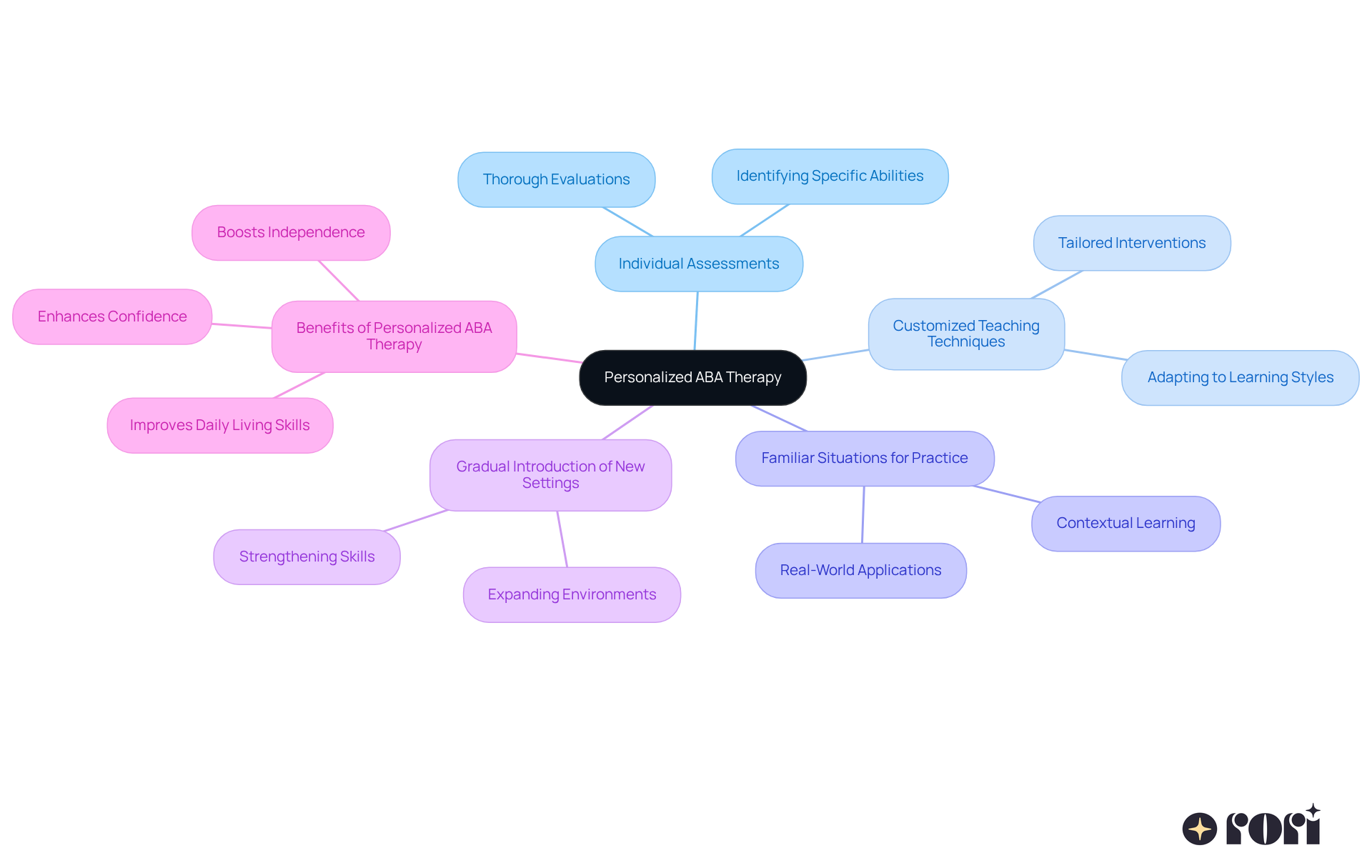
AI-powered tracking systems are really changing the game in ABA therapy! They give clinicians a deeper look into how a young person is progressing in different settings. These smart systems analyze behavioral data, offering effective strategies for generalizing skills in different environments for children with ASD, which helps therapists spot patterns in how skills are applied. For example, we know that behavioral differences in autism can often be seen as early as ages 2 to 3. This highlights just how crucial early intervention and monitoring can be.
With AI, clinicians can adjust treatment plans on the fly, making sure that strategies stay effective as the child grows. This technology not only boosts the accuracy of interventions but also serves as effective strategies for generalizing skills in different environments for children with ASD, providing families with practical, data-driven insights into their child's development. Dr. Zachary Warren points out that integrating AI can really enhance treatment outcomes. He says, "The ability to meaningfully dissect the heterogeneity that exists is hopefully what AI and advanced math can help us with."
Parents, it’s a great idea to ask about how AI tools are being used in your child’s treatment. These innovations are key to personalizing and improving autism care. Let’s explore this together! We’re here to help you every step of the way!
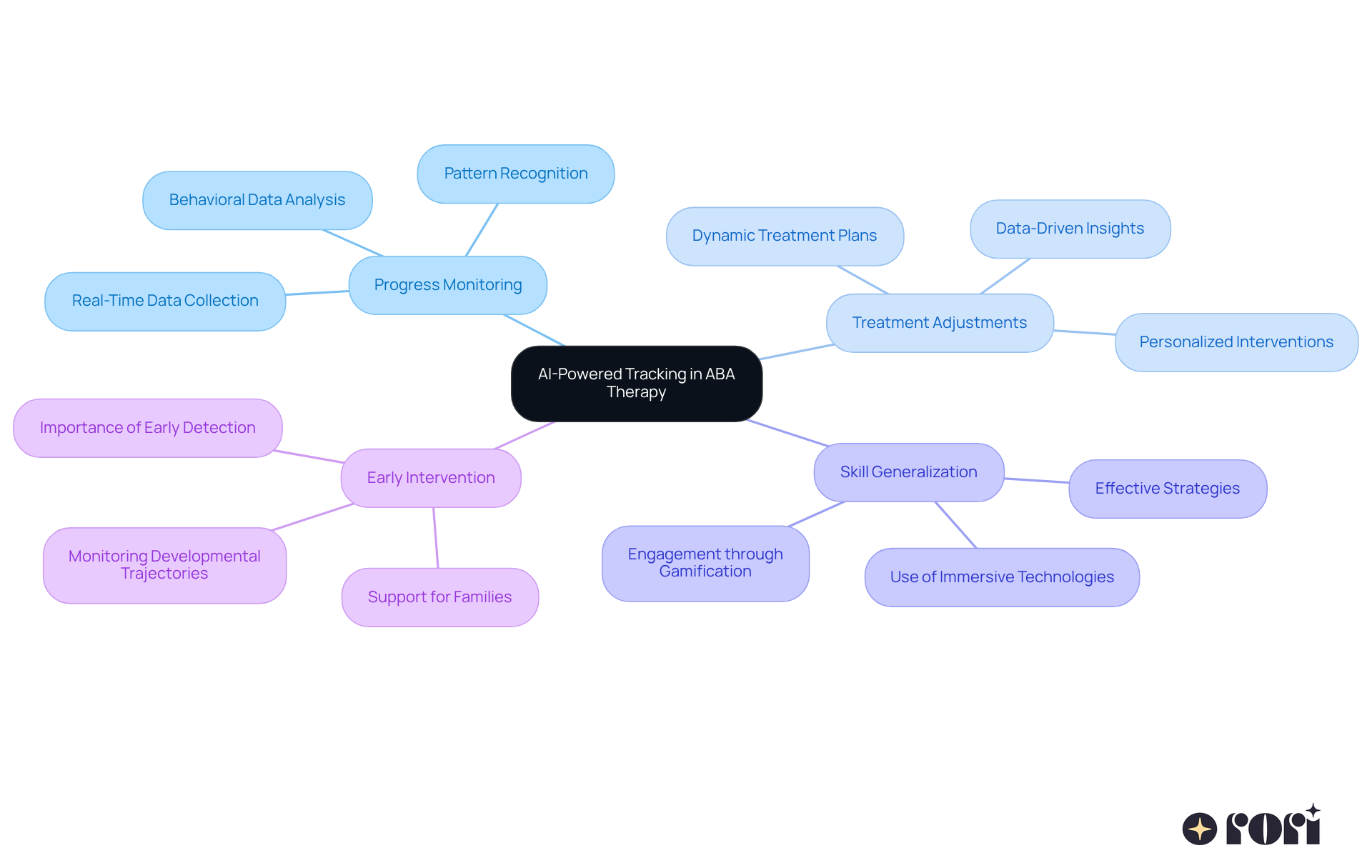
Caregiver participation is essential for employing effective strategies for generalizing skills in different environments for children with asd. When caregivers participate in the therapy process, they can utilize effective strategies for generalizing skills in different environments for children with asd to strengthen what their kids learn during daily routines. Imagine a training session designed just for caregivers, where they pick up practical strategies to use at home - like visual aids, role-playing, and consistent reinforcement methods. This teamwork not only enhances learning effectiveness but also creates a supportive environment that aids kids in developing effective strategies for generalizing skills in different environments for children with asd.
Studies show that children who receive steady support from their families tend to have better cognitive and developmental outcomes. It really highlights how crucial engaged family involvement is in ABA interventions. As one behavioral specialist noted, without parental engagement, it becomes challenging to implement effective strategies for generalizing skills in different environments for children with asd, leading to difficulties for kids in transferring what they learn in therapy to their home and community. So, it’s essential to equip caregivers with the right tools and knowledge to implement effective strategies for generalizing skills in different environments for children with asd to maximize the effectiveness of autism therapy.
Let’s explore this together! By working hand-in-hand, we can create a nurturing atmosphere that supports our children’s growth.
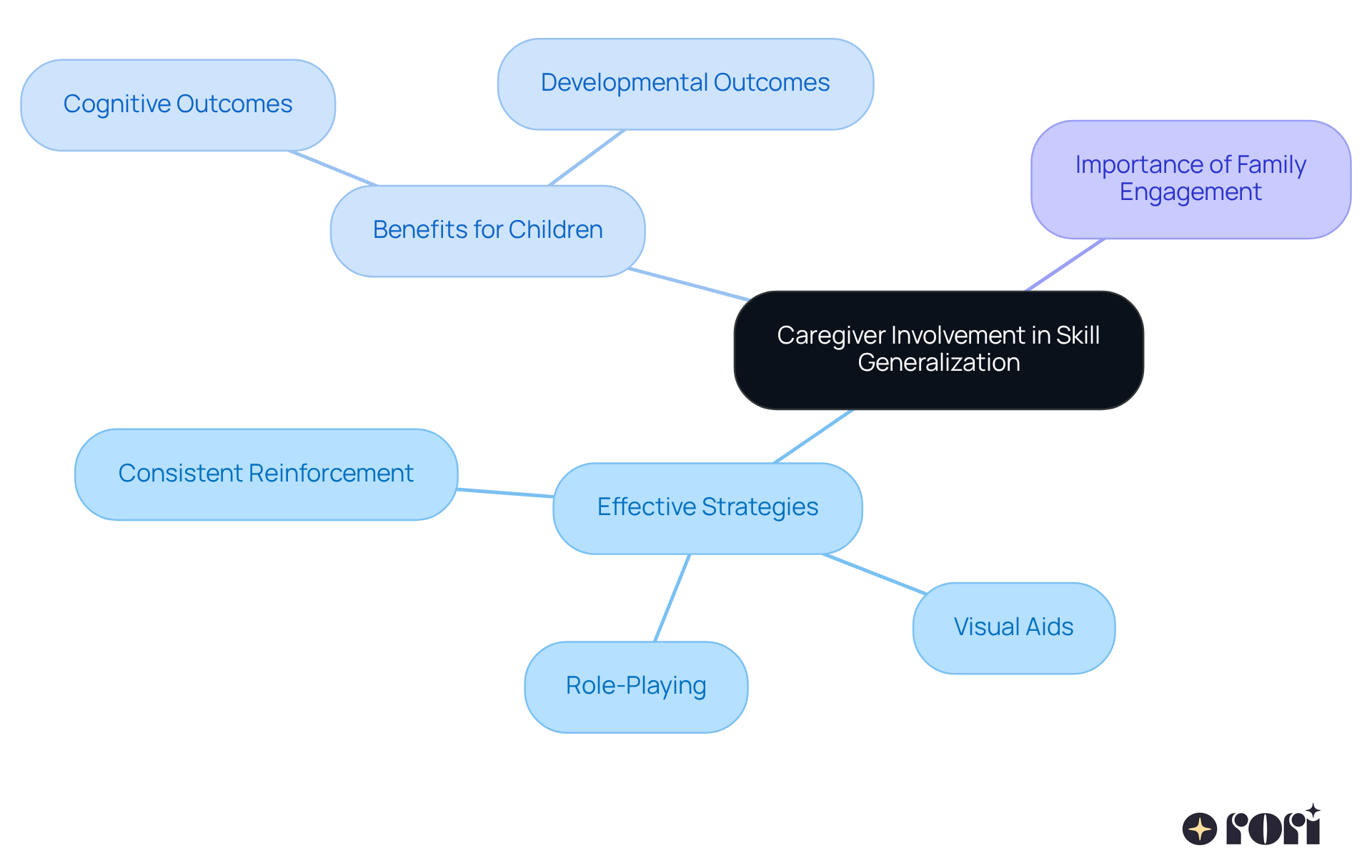
Contextual learning is essential for helping young learners apply their skills in various settings, utilizing effective strategies for generalizing skills in different environments for children with ASD. When kids practice abilities at home, school, and in the community, they learn effective strategies for generalizing skills in different environments for children with ASD, allowing them to adjust their behaviors to fit various situations. Techniques such as:
are effective strategies for generalizing skills in different environments for children with ASD, which can significantly enhance the learning process. This approach not only strengthens the skills gained in counseling but also employs effective strategies for generalizing skills in different environments for children with ASD, preparing them for real-world interactions.
At Rori Care, we truly believe in the power of caregiver involvement in this journey. Our patient-focused ABA treatment is tailored to meet each child's unique needs, ensuring that caregivers have the knowledge and strategies they need to support their development effectively. Research shows that when caregivers actively participate and implement recommended strategies, about 90% of children show significant progress. This collaboration not only enhances behavioral outcomes but also empowers caregivers, boosting their confidence and easing stress within the family.
Let’s explore this together! Your involvement can make a world of difference!

To bridge the gap between therapy and real life, one can utilize effective strategies for generalizing skills in different environments for children with ASD that can really help! Consider implementing effective strategies for generalizing skills in different environments for children with ASD by:
Plus, giving kids chances to practice in real-life situations, like grocery shopping or playdates, is one of the effective strategies for generalizing skills in different environments for children with ASD, and it can make a huge difference in how well they transfer those skills.
And let’s not forget about the importance of consistent reinforcement and feedback from caregivers during these activities. It really helps solidify the learning process! By empowering caregivers with a better understanding of ABA principles and strategies, they can offer even more support at home. This not only complements professional interventions but also promotes consistency.
When caregivers are actively involved, it leads to better behavioral outcomes and fosters informed decision-making. Ultimately, this means more effective and lasting progress for our kids. Let’s explore this together!
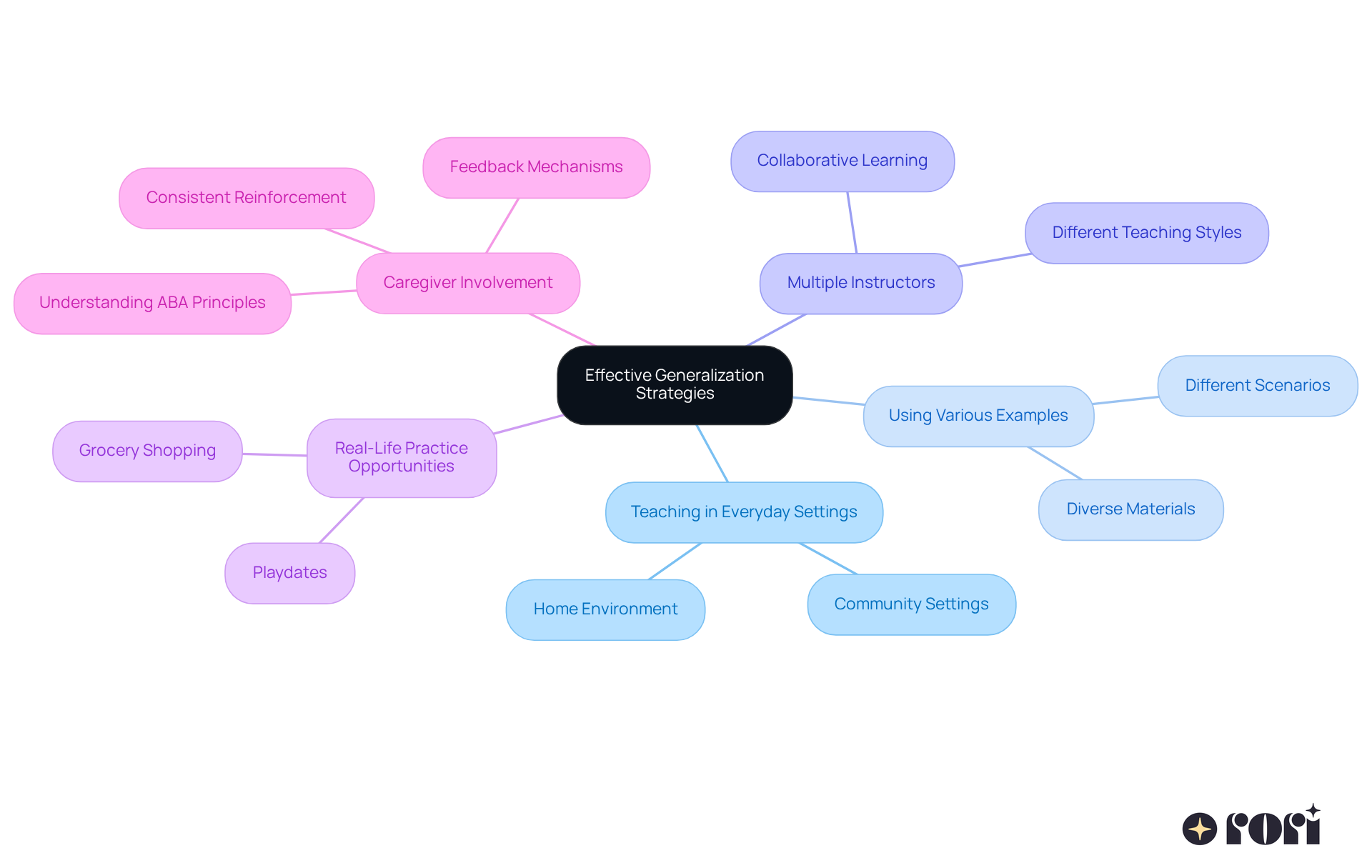
Keeping an eye on how abilities progress is super important when it comes to evaluating ABA treatment. You know, effective strategies for generalizing skills in different environments for children with ASD include:
At Rori Care, we’re excited to use advanced AI technology to automate progress report creation. This means our clinicians can focus more on treatment rather than paperwork-freeing up 50% more time for therapy! That’s a big win for personalized and effective interventions.
Research shows that individuals who consistently receive ABA intervention often enjoy improved independence and a better quality of life as they transition into adulthood. Our automatic data collection makes sure that sessions are recorded smoothly, without interrupting the therapeutic process. Plus, all data is securely stored, anonymized, and deleted after analysis. Regular evaluations help clinicians determine effective strategies for generalizing skills in different environments for children with ASD, identifying which abilities have been successfully generalized and which ones may need additional attention.
This ongoing evaluation process ensures that treatment plans are flexible and responsive to each child's evolving needs. It also aligns with best practices in the field. Behavioral analysts emphasize that evaluating effective strategies for generalizing skills in different environments for children with ASD is key to enhancing treatment effectiveness. This approach allows for customized interventions that promote lasting behavioral changes.
Caregivers, you play a crucial role in this journey! By actively participating in data collection and sharing feedback, you can help reinforce effective strategies for generalizing skills in different environments for children with ASD. According to the National Autism Center, success rates of ABA interventions often exceed 89%. That really highlights the importance of effective monitoring!
And let’s not forget about setting SMART goals for target behaviors. This best practice not only improves the evaluation process but also ensures that each individual’s unique needs are met. So, let’s explore this together! We’re here to help you every step of the way!
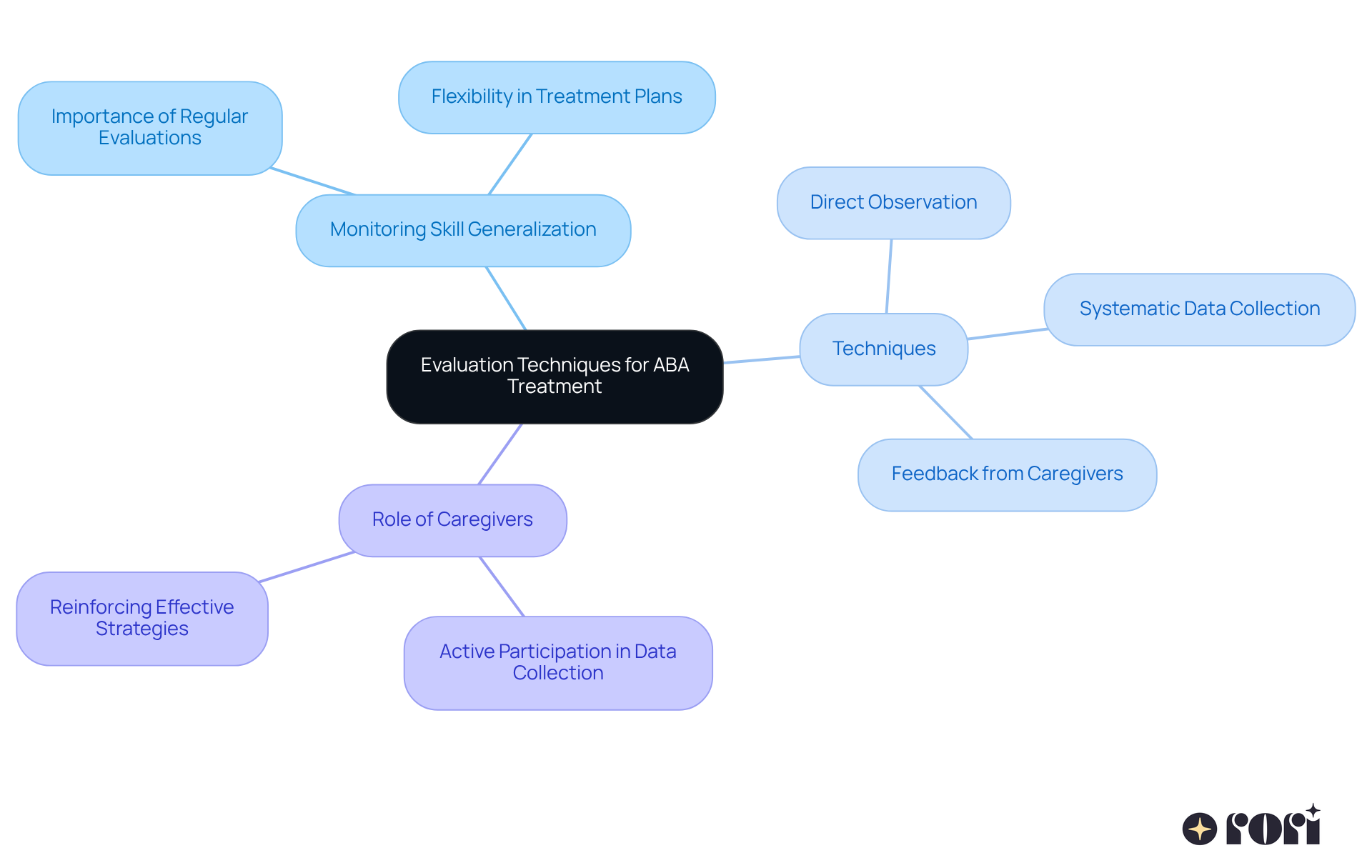
Case studies really show how effective ABA practice can be in helping kids generalize their skills. For example, one young person learned to ask for help using a picture card during therapy sessions. This skill came in handy during family outings, leading to a big boost in their independence!
In another case, a young individual practiced social skills through organized playdates, which helped them interact successfully in school settings. These real-world examples highlight just how effective strategies for generalizing skills in different environments for children with asd can be, particularly when consistent practice is implemented. Research shows that kids who receive at least 25 hours of ABA therapy each week make significant strides in social interactions and communication. This really emphasizes how important these approaches are for fostering independence and adaptive behaviors.
Now, let’s talk about the benefits of educating caregivers in this context:
As Dr. Lord emphasizes, a tailored approach is key for effectiveness. It’s so important for parents to consider how they can adapt effective strategies for generalizing skills in different environments for children with asd to fit their own situations and support their child’s development. Let’s explore this together!
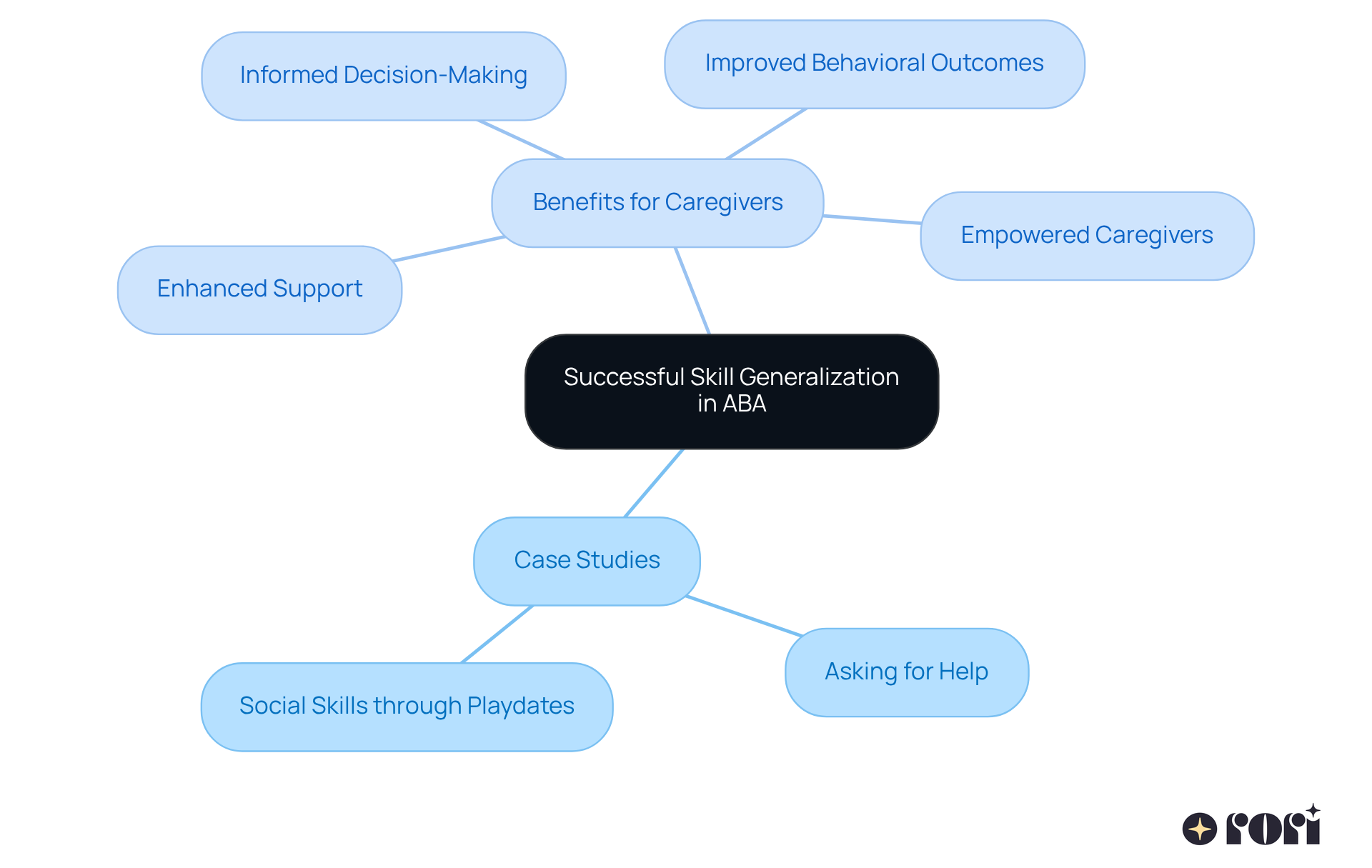
While teaching generalization abilities to children with autism can feel like a big challenge for parents, using effective strategies for generalizing skills in different environments for children with ASD through structured instruction can really make a difference! This approach breaks down skills into bite-sized pieces and teaches them in different settings. Methods like Discrete Trial Training (DTT) and Natural Environment Teaching (NET) are considered effective strategies for generalizing skills in different environments for children with ASD, as they assist kids in practicing their skills in both controlled and everyday settings.
Setting clear expectations and providing consistent support are effective strategies for generalizing skills in different environments for children with ASD, helping our young ones become more confident in using their skills in real-life situations. This organized way of teaching incorporates effective strategies for generalizing skills in different environments for children with ASD, which not only boosts learning but also encourages flexibility, allowing kids to navigate various settings with ease.
So, let’s explore this together! By embracing structured instruction, we can help our children thrive and feel more secure in their abilities. Remember, you’re not alone in this journey; we’re here to help you every step of the way!
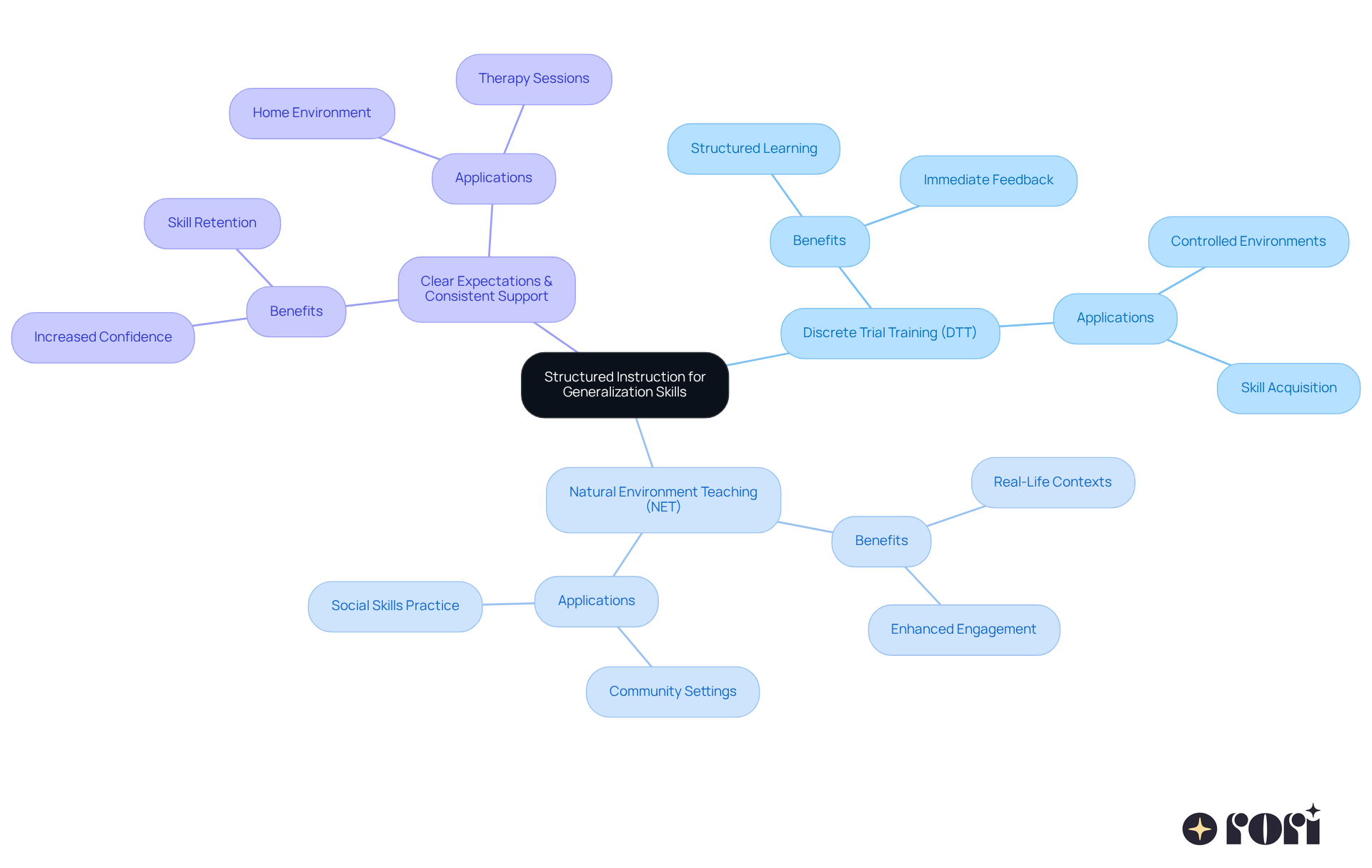
Generalization is such an important part of effective ABA therapy! It helps ensure that the skills learned in therapy can be used in everyday life, not just in the clinic. When kids can apply what they’ve learned in different situations, it really boosts their independence and adaptability-two key ingredients for long-term success.
Did you know that research shows youth who achieve strong generalization outcomes are 3.2 times more likely to keep their skills six months after treatment? That’s pretty impressive! Without successful generalization, the benefits of treatment can fade away, making it tougher for kids to tackle daily challenges.
For instance, kids who went through multiple exemplar training saw a 67% improvement in generalization compared to those who only had single-exemplar training. This really highlights how important it is to have varied learning experiences. Thus, focusing on effective strategies for generalizing skills in different environments for children with ASD is crucial for achieving meaningful and lasting results in ABA practices. It’s all about helping our children thrive in their everyday environments!
Let’s explore this together! If you have any thoughts or experiences to share, we’d love to hear from you!
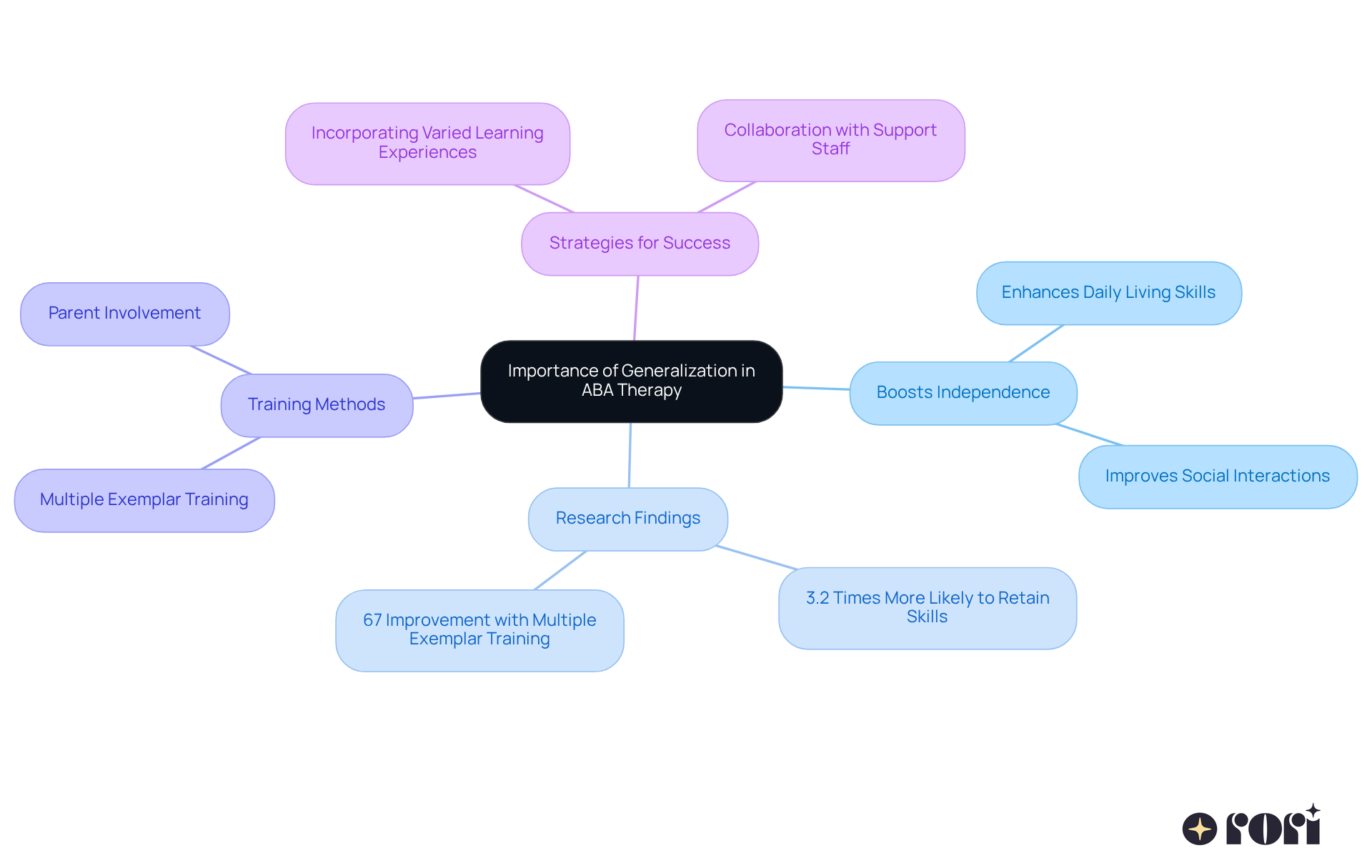
Families play a vital role in helping children generalize their abilities, and having access to educational resources can really boost their efforts. 🌟 Workshops and online courses tailored for parents in ABA therapy equip them with practical techniques to reinforce skills at home. Imagine being able to support your child’s learning journey with confidence! Research shows that when families actively engage in this process, they often see better results in applying effective strategies for generalizing skills in different environments for children with asd.
Plus, practical tools like:
can create structured environments that encourage consistent practice. By empowering families with knowledge and resources, we can help foster a nurturing space for our children’s growth and development. Let’s explore this together! If you have any thoughts or experiences to share, we’d love to hear from you!

The importance of skill generalization in ABA therapy is huge! It’s all about making sure that the skills kids learn in therapy actually fit into their everyday lives, helping them become more independent and adaptable. When families and clinicians team up to use effective strategies for generalizing skills in different settings, they create meaningful connections between therapy sessions and real-world situations.
In this article, we’ve explored various strategies, like:
Each of these plays a vital role in making sure kids can apply their skills effectively in different environments. Plus, the collaboration between caregivers and clinicians really highlights how important a supportive environment is for a child’s success.
Ultimately, skill generalization is a journey we all share. It takes dedication and creativity from everyone involved. By tapping into educational resources and actively participating in the therapeutic process, families can empower their children to thrive in daily life. Remember, the path to effective skill generalization isn’t just about learning; it’s about building a supportive community that nurtures growth and fosters independence. Let’s explore this together!
What is the approach of Rori Behavioral Innovations to ABA therapy?
Rori Behavioral Innovations emphasizes a personalized approach to ABA therapy, focusing on the individual needs of each child. Clinicians conduct thorough assessments to identify specific abilities that require attention, ensuring that interventions are tailored and effective.
How does Rori Care customize teaching techniques for children?
Rori Care customizes teaching techniques by matching them to each child's preferred learning style and using familiar situations for practice. They gradually introduce new settings to help strengthen learned abilities, which aids in skill generalization in different environments.
What role does AI play in enhancing ABA therapy at Rori Care?
AI-powered tracking systems provide clinicians with insights into a child's progress across different settings. These systems analyze behavioral data, allowing therapists to spot patterns and adjust treatment plans as the child grows, ultimately improving the effectiveness of interventions.
Why is caregiver involvement important in ABA therapy?
Caregiver participation is crucial for the successful generalization of skills in children with ASD. Engaged caregivers can implement effective strategies at home, which reinforces what children learn during therapy and creates a supportive learning environment.
What strategies can caregivers use to support their child's learning?
Caregivers can use practical strategies such as visual aids, role-playing, and consistent reinforcement methods. Training sessions designed for caregivers can help them learn and implement these strategies effectively at home.
What impact does family involvement have on children's development in ABA therapy?
Studies indicate that children who receive consistent support from their families tend to achieve better cognitive and developmental outcomes. Family involvement is essential for transferring skills learned in therapy to home and community settings.
How can parents inquire about the use of AI tools in their child's treatment?
Parents are encouraged to ask their child's therapists about how AI tools are being utilized in their treatment. Understanding the integration of AI can provide valuable insights into the personalization and improvement of autism care.